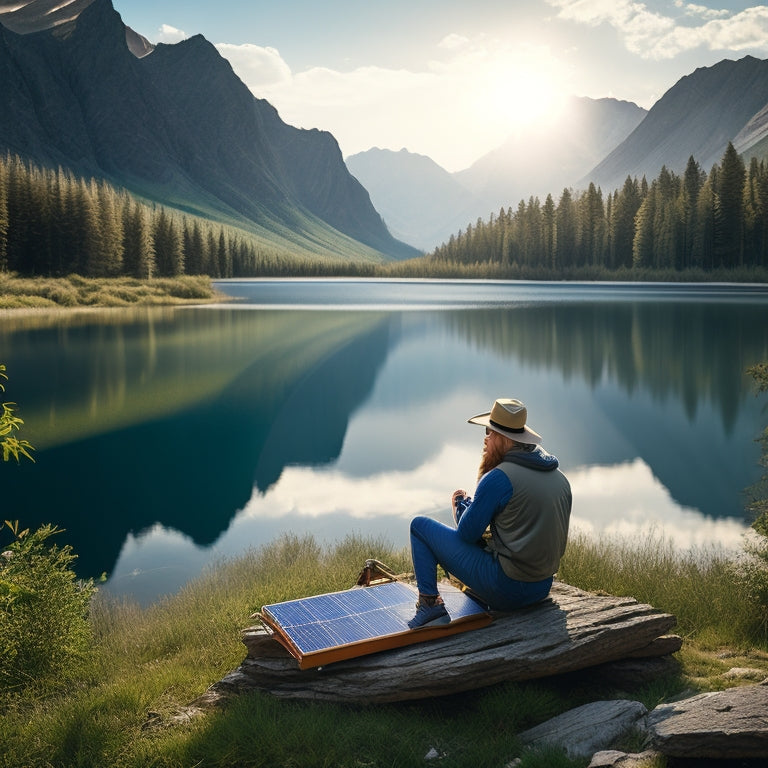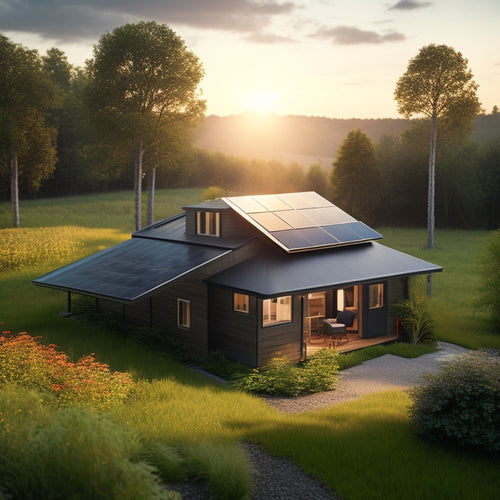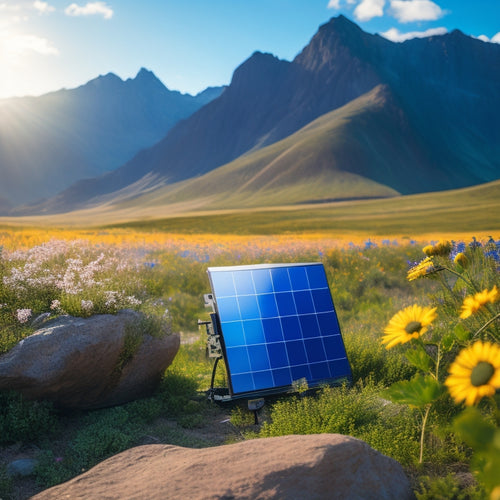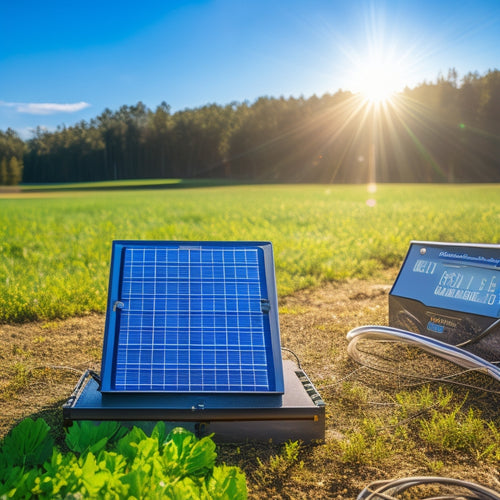
Top 10 Compact and Lightweight Solar Panels for Backpacking
Share
When you're backpacking, a compact and lightweight solar panel is essential for powering your devices efficiently. Look for models that weigh under two pounds and feature a foldable design for easy storage. Monocrystalline panels often provide higher efficiency, aiming for over 20% conversion rates. Depending on your trip length, consider wattage needs: 10-20W for short trips and 50-100W for longer ones. Make certain the panel has USB ports for direct device charging. Balancing portability with power output enhances your hiking experience, and discovering the best options can lead to the perfect solar solution for your excursions.
At a Glance
- Look for solar panels weighing under two pounds for optimal portability during backpacking trips.
- Choose compact designs that can easily fit into tight backpack spaces for efficient storage.
- Consider high-efficiency monocrystalline panels for better energy output in smaller sizes.
- Evaluate wattage options, aiming for 10-20 watts for short trips and 50-100 watts for longer excursions.
- Ensure the solar panel has appropriate voltage compatibility for charging your devices effectively.
Portability for Outdoor Adventures
When you're choosing compact solar panels for your backpacking trips, consider essential features that enhance portability, like foldability and ease of setup.
Evaluating energy demands based on your specific power requirements is vital, especially for devices like smartphones and GPS units, as noted in energy needs in wilderness.
You'll want to compare weight and size to guarantee your chosen panel fits seamlessly into your gear without burdening you.
Understanding these factors can make a significant difference in your outdoor experience.
Essential Features to Consider
Selecting compact solar panels for backpacking requires careful consideration of portability, as this directly impacts your outdoor experience. You want a system that's easy to carry and set up, guaranteeing it won't weigh you down on your excursions. Pay attention to durability factors; panels made from sturdy materials can withstand the rigors of the trail while providing reliable power.
Here's a quick reference table to help you evaluate essential features:
| Feature | Importance |
|---|---|
| Weight | Light enough for easy carry |
| Size | Compact for storage |
| Durability | Withstands outdoor elements |
| Installation Convenience | Easy to set up and use |
A panel that's lightweight and compact allows you to maintain your freedom, letting you travel further without worrying about extra gear. Additionally, verify that the installation convenience makes it user-friendly, so you can set it up in minutes, maximizing your time spent enjoying nature. Prioritizing these features will help you find a solar panel that complements your exploratory spirit while meeting your power needs.
Weight and Size Comparison
For backpacking, evaluating your options regarding weight and size is vital to ensuring an efficient outdoor experience. When it comes to solar panels, you'll want to take into account how their dimensions and mass affect your overall gear load.
Smaller, lightweight models often provide the best portability, allowing you to maximize your energy collection without compromising your freedom on the trail.
Examine the size limitations of your backpack or other transport methods. A compact solar panel can easily fit into tight spaces, while larger models might demand more room, potentially impacting weight distribution.
Proper weight distribution is essential for maintaining balance during hikes; uneven loads can lead to fatigue and discomfort.
Choose solar panels that weigh under two pounds for ideal ease. Many leading options fold or roll up, ensuring you can stow them efficiently.
Additionally, evaluate how much power you need versus the size and weight you can manage. Striking the right balance between power output and portability is key to enjoying your outdoor excursions while staying charged up on the go.
Efficient Energy On-The-Go
Efficient Energy On-The-Go
When you're backpacking, solar panel efficiency is essential for maximizing your energy output.
You'll want lightweight and portable options that pack easily while providing enough power for your devices.
Evaluating key features such as solar efficiency and durability can greatly enhance your outdoor experience and keep your gear charged on-the-go.
Understanding how to balance these factors can enhance your outdoor experience and keep your gear charged on-the-go.
Solar Panel Efficiency
Efficiency in solar panels is vital for maximizing energy output while backpacking, especially when space and weight are at a premium. Different solar panel types, such as monocrystalline and polycrystalline, offer varying degrees of efficiency. Monocrystalline panels, known for their high efficiency and compact design, can deliver more power per square foot, making them ideal for your limited setup.
When you're out in the wild, energy storage becomes essential. Pairing your solar panels with a reliable battery system guarantees you can store captured energy for use during cloudy days or at night. Lithium-ion batteries are popular for their lightweight and high energy density, allowing you to pack more power in less space.
To maximize efficiency, consider the angle and positioning of your panels. Even slight adjustments can greatly enhance energy capture.
Portability and Weight
While you're traversing remote trails, the portability and weight of your solar setup can greatly impact your overall experience. Opting for compact designs is essential, as they allow you to maximize energy generation without burdening your pack. Lightweight solar panels are engineered specifically for backpackers, guaranteeing you can easily stow them away when not in use.
When selecting the right system, consider travel-friendly options that fold or roll up for efficient storage. These designs not only save space but also minimize the weight you carry, allowing you to focus on the expedition ahead. Some panels weigh less than a pound, making them ideal companions for those long treks.
Additionally, look for features like integrated hooks or attachments that facilitate easy setup. This way, you can quickly capture the sun's power during breaks without disrupting your rhythm.
Key Specifications and Benefits
When choosing compact solar panels for backpacking, you'll want to evaluate the power output options available to guarantee your devices stay charged.
High-efficiency solar panels, particularly high-efficiency monocrystalline panels, are recommended due to their superior energy output in a compact format.
Portability features are equally important, as they determine how easily you can carry the panels on your expedition.
Understanding these specifications will help you select the right system for your outdoor escapades.
Power Output Options
In the domain of backpacking, selecting solar panels with the right power output options is essential for ensuring a reliable energy supply.
You'll want to evaluate wattage options, as they directly affect how many devices you can charge and how quickly you can do so. Most compact solar panels range from 10 to 100 watts, allowing flexibility based on your energy needs.
For short trips where you only need to power small devices like smartphones, a lower wattage panel (10-20 watts) suffices. However, if you plan on longer excursions or need to charge larger devices like tablets or power banks, aim for panels with higher wattage options (50-100 watts).
Consider also the efficiency of the solar panel. Higher efficiency means you can generate more energy in less time, maximizing your charging capabilities.
Look for models that provide USB ports for direct device charging, or those with built-in batteries for energy storage.
Ultimately, the right power output options will enable you to maintain your freedom on the trail, ensuring your gear stays powered and ready for use, no matter where your journeys take you.
Portability Features
Portability is a critical factor in selecting solar panels for backpacking, as you'll want gear that adds minimal weight and bulk to your load. The best portable solar panels incorporate a compact design and foldable options, allowing you to easily stow them in your backpack without sacrificing power.
Here's a quick overview of key specifications and benefits to evaluate:
| Model | Weight (lbs) | Folded Size (inches) |
|---|---|---|
| Solar Panel A | 1.5 | 12 x 6 |
| Solar Panel B | 2.0 | 14 x 7 |
| Solar Panel C | 1.8 | 11 x 5 |
| Solar Panel D | 2.5 | 15 x 8 |
| Solar Panel E | 1.2 | 10 x 4 |
When choosing your solar panel, check both the weight and the folded dimensions. Lightweight options make it easier to hike long distances, while foldable designs guarantee that you can carry them without hassle. A compact solar panel not only provides power but also enhances your freedom to navigate the great outdoors.
Selecting Based on Weight Capacity
When selecting compact solar panels for backpacking, it's vital to assess the voltage requirements to guarantee they meet your device's needs.
Additionally, consider the portability features, as a lightweight design can greatly enhance your overall hiking experience.
A cleaner and quieter alternative to traditional generators is an important aspect to keep in mind, as it promotes a more serene environment while camping.
Balancing these factors will help you choose the right solar panel without compromising on weight capacity.
Assessing Voltage Requirements
Choosing the right voltage for compact solar panels requires careful consideration of your backpacking gear's power needs and weight limitations.
Start by evaluating the voltage compatibility of your devices. Most portable electronics, like smartphones and tablets, require either 5V or 12V for efficient charging. If you're planning to charge multiple devices simultaneously, verify your chosen solar panel can handle the cumulative voltage requirements.
Next, assess the weight capacity of your setup. Lighter panels often produce lower voltages and may struggle to charge larger devices effectively.
However, heavier panels typically provide higher output and can recharge gear more quickly. Strike the right balance between portability and power by selecting a panel that meets your voltage needs without compromising on weight.
Considering Portability Features
For backpackers, selecting solar panels based on weight capacity is essential to maintaining an efficient and manageable load. You want solar panels that won't weigh you down, allowing you to traverse trails without sacrificing energy needs. Look for options made from lightweight materials and a compact design that fits seamlessly into your gear.
When comparing solar panels, consider their weight-to-output ratio. A panel that's too heavy can hinder your mobility, while one that's too light may not provide enough power. Below is a quick comparison of popular models:
| Model | Weight (lbs) | Output (W) | Folded Size (in) |
|---|---|---|---|
| UltraLight Solar 50W | 3.5 | 50 | 12 x 10 |
| CompactPower 30W | 2.2 | 30 | 11 x 8 |
| MiniMax 20W | 1.8 | 20 | 10 x 7 |
| Trekker 100W | 4.0 | 100 | 15 x 12 |
Choosing the right solar panel can enhance your backpacking experience, offering the freedom to power your devices while keeping your load light.
Higher Wattage per Pound
When you're backpacking, maximizing power while minimizing weight is essential.
Higher wattage per pound means you can charge your devices more efficiently without adding unnecessary bulk to your pack.
Understanding the efficiency-to-weight ratio helps you choose the right solar panel for your needs.
Efficiency vs. Weight Ratio
Maximizing efficiency while minimizing weight is crucial for backpackers relying on solar power. When choosing compact solar panels, focus on the efficiency vs. weight ratio, which fundamentally measures how much wattage you get per pound.
Advanced solar panel technology has evolved remarkably, allowing for lightweight designs that still utilize impressive energy output. Look for panels that offer high conversion efficiency, typically above 20%. This means you'll capture more sunlight and convert it into usable power, reducing the need for larger, heavier setups.
Pairing efficient panels with quality energy storage solutions, like lightweight batteries, guarantees you can store power for use when the sun isn't shining. Always consider how these panels' wattage stacks up against their weight. A panel that delivers 20 watts while weighing only 2 pounds offers a solid ratio, allowing you to optimize your pack's weight without sacrificing energy needs.
Frequently Asked Questions
What Is the Lifespan of Compact Solar Panels?
Compact solar panels typically last 20 to 25 years, depending on their solar panel materials and technology. By understanding compact solar technology, you can maximize your investment and enjoy reliable, portable energy for your excursions.
Can Solar Panels Charge Multiple Devices Simultaneously?
Yes, solar panels can charge multiple devices simultaneously, depending on the solar panel types and their charging capacity. You'll find models designed for efficient energy distribution, allowing you to power gadgets without sacrificing freedom on the go.
Are Solar Panels Waterproof or Water-Resistant?
Not all solar panel types are waterproof, but many use waterproof materials. If you're considering outdoor use, check the specifications to guarantee durability against moisture, as this will enhance your freedom to charge devices anywhere.
How Do Weather Conditions Affect Solar Panel Efficiency?
Did you know cloudy days can reduce solar efficiency by up to 25%? Weather impacts solar efficiency factors like temperature and sunlight intensity, so understanding these elements helps you optimize energy production in varying conditions.
What Accessories Are Needed for Optimal Solar Panel Use?
To optimize solar panel use, you'll need a portable battery for energy storage and solar panel mounts for stability. These accessories enhance efficiency, ensuring you capture every ray while enjoying your outdoor excursions.
Explore More
In your quest for the perfect compact solar panel, remember that portability and efficiency go hand-in-hand. As you hike through rugged terrains, the right panel can provide reliable energy for your devices, enhancing your outdoor experience. Coincidentally, choosing a lightweight model doesn't mean sacrificing power; many options deliver impressive wattage per pound. So, whether you're scaling mountains or enjoying a serene campsite, the ideal solar panel will keep you connected, making every expedition more enjoyable and sustainable.
Related Posts
-

Diy Off Grid Solar
By embracing DIY off-grid solar, you can break free from grid dependence, slashing your energy bills by up to 90% and...
-

High-Efficiency Solar Battery Chargers for Remote Areas
High-efficiency solar battery chargers are essential for your off-grid energy needs in remote areas. They maximize en...
-

Choosing the Right Solar Power Charge Controller
Choosing the right solar power charge controller is crucial for maximizing energy efficiency and extending battery li...


